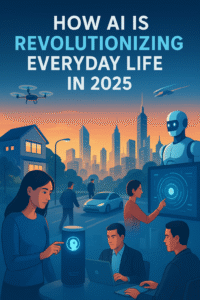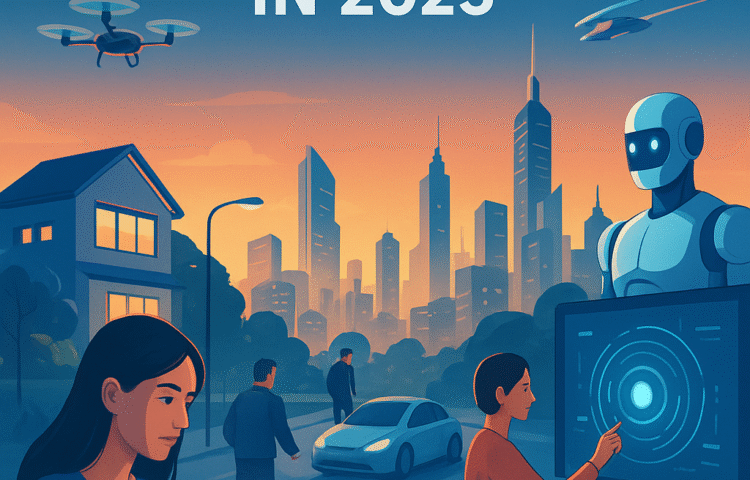How AI Is Revolutionizing Everyday Life in 2025
Artificial Intelligence (AI) is no longer a future phenomenon—it’s a working component of our daily lives. In 2025, AI has transcended laboratories and technology firms; it’s now present in our homes, offices, schools, and even vehicles. Bringing AI to daily life has made everything smarter, faster, and more personalized than ever.
Smarter Homes for Smarter Living
Our houses are now smart friends. Automated gadgets such as voice assistants, smart refrigerators, and smart thermostats are learning our routines and adapting accordingly. Just think of waking up to a house that already knows your morning schedule — coffee brewed, curtains drawn, and your favorite music playing.
In 2025, home systems powered by AI can sense that you’re out of groceries, control temperatures according to weather predictions, and even warn you in case there’s suspicious activity at or around your home. It’s ease, security, and functionality all under one smart system.
The Age of Autonomous Transportation
Transportation is among the most AI altered industries. Autonomous vehicles are no longer in testing mode—they’re on actual roads in numerous nations. They apply AI to scan the traffic, anticipate pedestrian action, and make split-second choices, slashing accidents caused by human action.
Aside from cars, AI traffic systems are rendering cities smarter by managing signals, anticipating congestion, and coordinating public transport schedules. Traveling to work is becoming smoother, quicker, and considerably safer due to intelligent systems anticipating the future.
AI in the Workplace: The New Coworker
AI has also redesigned the manner in which we work. From AI chatbots managing customer service to intelligent data analytics tools forecasting market trends, companies are riding high on automation and intelligence.
Workers are no longer wasting hours on routine tasks—AI software does that. Rather, humans are concentrating on innovation, creativity, and strategic thinking. Freelancers and remote workers, too, are leveraging AI platforms such as ChatGPT, Jasper, and Notion AI to write, design, and project manage more effectively.
In 2025, AI is not taking jobs away—it’s redefining them. The attention has turned toward collaboration of human intelligence and machine accuracy.

AI in Healthcare: Saving Lives Every Day
The healthcare industry has witnessed one of the strongest influences of AI. Sophisticated systems can now diagnose diseases sooner, interpret medical images quicker, and suggest personalized therapies more accurately.
Wearable devices track your heart rate, oxygen levels, and sleep patterns in real time. AI interprets this information to identify abnormalities before they become severe. Virtual health assistants are assisting patients with scheduling appointments, filling prescriptions, and even medication reminders.
This proactive care fueled by AI is not only enhancing lives — it’s saving them.
AI and Education: Learning for Everyone
Education has become more personalized and flexible with the help of AI. Intelligent learning platforms track every student’s performance, strength, and weak areas to develop personalized learning paths.
Teachers are leveraging AI to automate grading, monitor progress, and determine where students require additional help. Students can now learn a language with the help of chatbots, drill math with virtual tutors, or study history with the assistance of AI powered simulations.
Learning in 2025 isn’t onesizefitsall anymore — it’s personalized to every learner’s pace and potential.
The Human AI Connection
AI in 2025 is not about replacing humans, but expanding human potential. Whether organizing us, making cities smarter, or keeping us healthier, AI has become an invisible assistant in our daily lives.
The boundary between technology and life only gets blurred further—but in the most wonderful way possible. With careful innovation and responsible application, AI is going to make our world not only smarter, but more humancentric.
In short:
AI is not the future—it’s the present, and it’s transforming the way we live, work, learn, and interact. And the true revolution ahead will be how humanity adapts to utilizing AI not only for progress, but for purpose.
